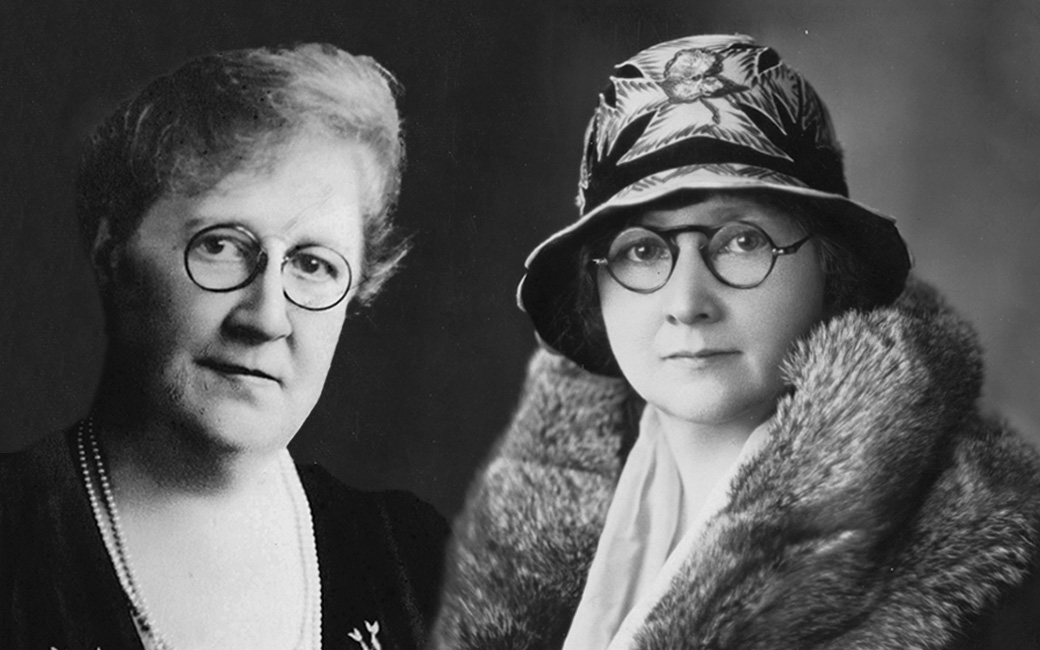TU launches giving society named for pioneering female leaders on International Women's Day
Tall-Wiedefeld Society advocates for women at Towson University
By Phaedran Linger ’22 on March 7, 2022

In celebration of International Women’s Day on March 8, Towson University is launching the Tall-Wiedefeld Society to honor TU’s women leaders, build community and create a permanent legacy to address the needs of young women at TU.
The society is a growing collective that supports positive change through philanthropy and education. It is named after two influential figures from Towson University history who demonstrated how women can change the future: Lida Lee Tall and Dr. Mary Theresa Wiedefeld. Together, they guided TU’s growth for more than a quarter century (1920–47).
Towson University has a legacy of women in lead roles that extends from its early history to the current leadership of Kim Schatzel.
“I’m the 14th president at Towson University, and, throughout my career, I’ve been the first or the only woman to do my job. However, at TU, that is not the case,” Schatzel says. “I’m the fifth woman to serve as president at Towson University.”
Schatzel notes that Tall and Wiedefeld made monumental strides in impressive, back-to-back female presidencies.
“I can look back at their leadership and not only thank them but also see how they took advantage of opportunities to move TU forward to help in its rise to what it is today—a national leader in inclusive excellence providing leadership for the public good,” Schatzel says.
The Tall-Wiedefeld Society is co-chaired by Tricia Turley Brandenburg, deputy director of athletics and senior woman administrator, and Donnice E. Brown ’91, ’94, assistant director and chief of youth services for the Baltimore Mayor’s Office of Employment Development.
“We want this society’s membership to grow beyond women philanthropists. We welcome all members and recognize our collective giving power and ability to make a difference for Towson University and our students,” says Brian DeFilippis, vice president for university advancement, “The society will fund projects through a member-driven, competitive grant process to benefit innovative and creative thinking.” The first grant awards will be made in March 2023 during Women’s History Month.
To learn more about the society’s namesakes, we spoke with Felicity Knox ’94, the library associate to the Special Collections and University Archives.
Learn more about how the Tall-Wiedefeld Society recognizes the collective giving power of women and their ability to make a difference.
Join TodayLida Lee Tall
As the leader of what was then the Maryland State Normal School (MSNS) from 1920–38, Tall not only bolstered the institution’s credibility but also guided it through the Great Depression.
Born in Dorchester County, Maryland, in 1873, Tall moved to Baltimore in her early childhood and earned her bachelor’s degree in 1914 at Columbia University.
When she started as principal in 1920, the institution was still recovering from the enrollment decline as a result of WWI.
Knox says that, at the time, Stephens Hall was the only building that had classrooms. Tall wanted to put all efforts into making the school a place students wanted to be, so she expanded campus facilities. Along with Stephens came Richmond Hall, Van Bokkelen Hall and, finally, the Glen.
Tall also made advancements in teacher education. When she started, the school was awarding certificates instead of degrees. In 1934, the Maryland General Assembly granted the school the ability to award four-year Bachelor of Science degrees in education. Tall’s title was then changed from principal to president.
“She wanted to help students grow as people,” says Knox, pointing to the many ways Tall’s leadership enriched campus facilities and culture.
Mary Theresa Wiedefeld
Wiedefeld was born in 1866 in Baltimore County. She graduated from MSNS in 1904.
Ambitious and ready to continue what Tall had started, Wiedefeld joined the MSNS faculty in 1914 as a teacher and started her presidency immediately following Tall in 1938.
“This school was her alma mater; she really believed in it and the mission,” says Knox.
With the beginning of WWII in 1939, Wiedefeld became concerned about how the institution would be impacted by the conflict, especially the draft. As students and staff left due to war efforts, she introduced special programs to alleviate the teacher shortage. She encouraged the formation of faculty groups and helped establish a regular faculty salary scale.
Wiedefeld truly envisioned the school as a community, Knox explains. She raised funds for amenities like Burdick Pool. She also added new curricula, which set the foundation for what is now the College of Liberal Arts. Wiedefeld’s image of what a university should be was far ahead of her time, Knox adds, but it paved the way for the TU we know today.
“If I could have dinner with anyone, it would be [her],” says Knox, noting Wiedefeld’s innovative professional ability and her strength in difficult times.
Knox believes these two women made such an impact because of their devotion to students and what it meant for them to go to a university. These women exemplify the long-lasting impact of women in leadership at TU.
For more information on the society or to join, visit towson.edu/womensgiving.
Phaedran Linger is a senior majoring in mass communication at TU. She is a student editorial assistant for University Marketing & Communications